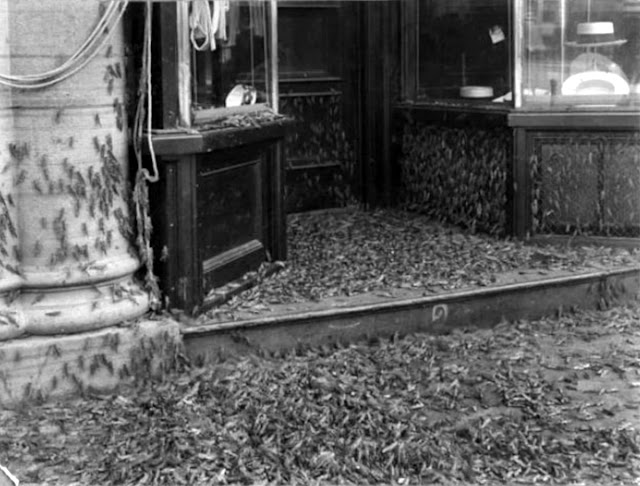Grasshoppers like hot, dry weather. Some of the people who survived the 1930s on the plains have stories of how swarms of hoppers descended on them, eating entire fields and even farm implements and household items. Fields of corn or alfalfa or oats could be destroyed in hours. The grasshoppers would eat anything. The conventional wisdom was that hoppers liked salt, and so they would eat the shirt off your back, or wherever else sweat landed.
During the summer of 1937, however, the battle was joined by a merciless army of countless grasshoppers, able to use a combination of air and ground maneuvers, mass movements and destructive capabilities to erase everything in its path.
They cut a swath of destruction across the southeastern portion of Colorado, and threatened to enter Kansas and New Mexico.
The Colorado Springs Gazette observed the insects were “eating anything they come to. All vegetation has been eaten with the exception of lambs-quarters. And they’ll eat lambs-quarters if there’s nothing else.”
The problem had been detected the previous autumn. Entomologists spotted a large number of eggs in the region, perhaps carried to the area from Texas by east winds. Millions of nests, each with several dozen eggs, were discovered.
They hatched in June 1937.
Wingless at first, the hoppers crawled across the land like a shadow.
“Unable as yet to fly, the hungry hoppers chewed at fence posts, clothing, hair on cattle - practically anything they could find that would fill their hungry stomachs,” Popular Science magazine reported later that year.
Brig. Gen. Alphonse J. Ardourel, Colorado’s adjutant general, was asked to join a “war council”' to help develop tactics to destroy these dangerous invaders.
Gov. Teller Ammons declared a state of emergency, which brought the Guard to the front line.
“Some people are making jokes out of the fact that the National Guard was called into service to help fight the grasshopper plague,” the governor said, “but it is one of the most serious situations that ever confronted Colorado and I only wish I had more trucks and equipment that could be thrown into this war on those insects.”
(via The National Guard)









0 comments:
Post a Comment